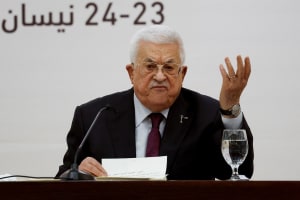Libya dismantled its own nuclear program - a viable model for Iran? Understanding PM Netanyahu's preferred scenario

During his recent visit to Washington, DC, for meetings with President Donald Trump, Israeli Prime Minister Benjamin Netanyahu several times brought up the "Libyan option" to deal with Iran's nuclear program.
During a question-and-answer period following their meeting, Netanyahu said that both Israel and the U.S. were united in their understanding that Iran should not have nuclear weapons.
“That could be done diplomatically, in a full way, the way it was done in Libya. I think that would be a good thing,” he continued, referring to a 2003 deal under which Libya voluntarily agreed to fully dismantle its nuclear weapons program.
“But whatever happens, we have to make sure that Iran does not have nuclear weapons.”
In a statement in Hebrew, released shortly before departing the U.S., Netanyahu again referred to the Libya example, saying a diplomatic agreement is possible - “but only if it’s a Libya-style agreement – where they go in, destroy the facilities, dismantle all the equipment under American oversight and execution.”
"The second option, is that it doesn’t happen. In that case, the talks are simply stalled, and the other option is military,” Netanyahu stated. Trump also referred to the potential for a military option, stating that it would be better for Iran to agree to a deal.
“I think if talks aren’t successful with Iran, I think Iran is going to be in great danger, and I hate to say it, because they can’t have a nuclear weapon. It’s not a complicated formula,” Trump said.
So what was the Libya nuclear agreement?
The country of Libya, under the leadership of dictator Muammar Gaddafi, had pursued a clandestine nuclear weapons program since at least the late 1970s.
It had largely acquired technology and materials for the program illicitly, due to restrictions on sales of the technology over fears of a terror state achieving nuclear weapons. The country was considered one of the most isolated and unpredictable countries, next to North Korea.
Following the March 2003 invasion of Iraq – part of the broader “War on Terror” launched after the September 11, 2001, attacks – President George W. Bush adopted a policy aimed at limiting the spread of weapons of mass destruction (WMD). With the support of British Prime Minister Tony Blair, Bush chose Libya as a test case for using diplomacy, rather than sanctions or military force, to achieve disarmament.
The three nations participated in discrete negotiations to convince Libya to willingly abandon its nuclear weapons program.
In December 2003, the nations announced that an agreement had been reached, under which Libya agreed to completely dismantle its nuclear weapons program, including the destruction or confiscation of all related infrastructure and materials, including centrifuges, uranium enrichment equipment, and other equipment.
In addition, Libya committed to ending all other WMD programs, including chemical and biological research facilities. As part of the enforcement of the agreement, Libya granted access to International Atomic Energy Agency (IAEA) inspectors, as well as other inspectors from the U.S. and the UK.
Due to its support for terror and its pursuit of WMDs, Libya had been placed under crippling sanctions, which had a debilitating impact on the country’s economy. As part of the negotiations, the U.S. and the UK agreed to lift sanctions on the country, including allowing Libya to again sell oil on the global market.
Western oil companies, like BP and Shell, were again permitted to enter the Libyan oil industry, bringing much needed investment to the depressed Libyan economy.
Additionally, both the U.S. and the UK. also restored full diplomatic relations with Libya, which had been previously cut. The U.S. reopened its embassy in Tripoli, and both countries removed Libya from the list of state sponsors of terror.
UK Prime Minister Tony Blair visited Libya in 2004, marking the full restoration of ties between the two countries.
After signing the agreement, Libya moved quickly to carry out the agreed terms, and within months of announcing the deal, most of the nuclear equipment had been removed and taken to the United States for dismantling and disposal.
The initiative in the Libyan nuclear weapons dismantling agreement came from Gaddafi, after seeing the destruction of Iraq and the fall of Saddam Hussein. Apparently wary of a similar fate, the dictator decided to abandon the weapons program in order to change his pariah status.
While Gaddafi was ultimately removed from power and killed during the Arab Spring uprising, the move appeared to be a victory for diplomacy over military force.
While the circumstances are similar between Libya and Iran, with both having been declared state sponsors of terror, and both being subjected to crippling sanctions over the years, there are some significant differences as well.
Unlike Libya, which was run by a singular dictator with the ability to run secret negotiations, the Iranian regime's structure is different.
The Islamic Republic has built its identity on standing against the West, particularly the United States and Israel. It is not clear that it would be willing to agree to a deal which would be seen by many as a capitulation to those two enemies.
The announcement by Trump of the upcoming discussions also removes the element of secrecy, which could have given Iran the possibility of agreeing to certain compromises.
By publicly announcing the talks, Trump has also increased the pressure on Iran not to concede too much.

The All Israel News Staff is a team of journalists in Israel.
You might also like to read this:

















